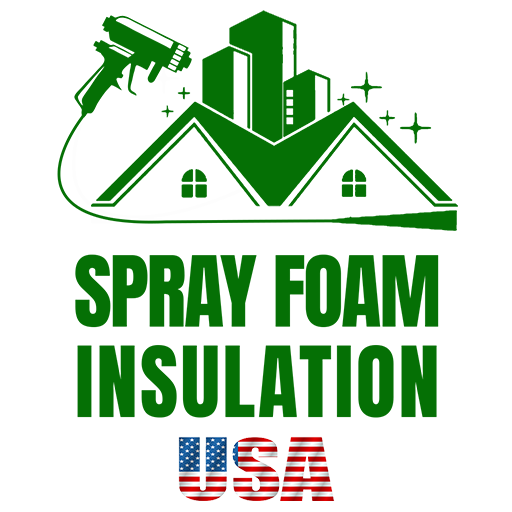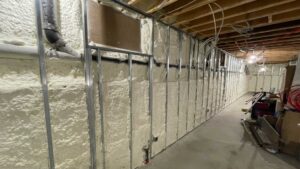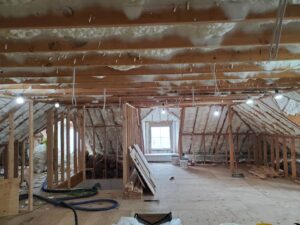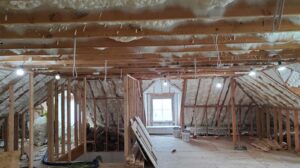When searching for commercial spray foam insulation, it’s vital to know that it serves as a superior insulation method compared to traditional materials. Offering high energy efficiency, moisture control, and the ability to air seal buildings effectively, spray foam insulation is an essential investment for any commercial property looking to optimize its energy usage and ensure a comfortable indoor environment.
Here’s a quick guide to commercial spray foam insulation:
– Types Available: Medium-density closed-cell and low-density open-cell.
– Suitable Applications: Exterior and interior surfaces across various buildings like educational, healthcare, and retail.
– Benefits: Energy efficiency, air sealing, and moisture control.
– Considerations: Higher initial cost but long-term savings in energy bills.
Spray foam insulation stands out for its versatility and performance in commercial settings, making it a top choice for owners in NY and NJ seeking effective, eco-friendly solutions.

In a nutshell, commercial spray foam insulation is more than just filling gaps; it’s about building a sustainable, efficient future for your property. Through the upcoming sections, we’ll dive deeper into understanding the different types of spray foam insulation, their specific benefits, and the installation process to ensure you’re well-informed about this powerful insulation solution.
Understanding Spray Foam Insulation
When we talk about insulating commercial properties, the term “spray foam insulation” pops up quite often. But what exactly is it, and why is it such a popular choice? Let’s break it down into simpler terms and look at the types, the difference between open-cell and closed-cell, and what R-value means in this context.
Types of Spray Foam Insulation
Spray foam insulation can be divided into two main types:
-
Open-Cell Foam: Think of this as a sponge. It’s lighter and has a softer structure. This type is excellent for soundproofing because of its ability to absorb sound. However, it’s not the best at blocking moisture.
-
Closed-Cell Foam: Imagine a hard, dense sponge. This type is much stronger and acts as a great moisture barrier. It also adds to the structural integrity of the building. Because of its density, it has a higher R-value, which we’ll get into next.
R-value Explained
R-value is a term that might sound technical, but it’s actually pretty straightforward. It measures how well insulation can resist heat flow. The higher the R-value, the better the insulation’s effectiveness. Closed-cell foam, with its dense structure, typically has a higher R-value compared to open-cell foam. This means it’s more effective at keeping heat in during winter and out during summer, making your commercial property more energy-efficient.
Open-Cell vs Closed-Cell: Which One to Choose?
Choosing between open-cell and closed-cell foam depends on your specific needs:
-
For Soundproofing: If your main concern is reducing noise, open-cell foam is the way to go. Its sponge-like structure is great at absorbing sound.
-
For Moisture Control and Structural Strength: If you’re looking for insulation that also acts as a moisture barrier and adds to the building’s strength, closed-cell foam is your best bet. Its dense structure blocks moisture effectively and reinforces the building’s walls.
-
For Energy Efficiency: Both types improve energy efficiency, but closed-cell foam, with its higher R-value, is the superior choice if you want to maximize energy savings.
In Summary
Understanding the types of spray foam insulation and their respective benefits is crucial in making an informed decision for your commercial property. Whether you prioritize soundproofing, moisture control, structural strength, or energy efficiency, there’s a spray foam insulation solution that fits your needs. The goal is not just to insulate but to do so in a way that contributes to a sustainable, efficient future for your commercial space.
Keep in mind the importance of choosing the right type of spray foam insulation for your specific project. The right choice can lead to significant energy savings, improved comfort, and even contribute to the structural integrity of your building. Next, we’ll explore the benefits of commercial spray foam insulation in more detail, helping you see why it’s such a powerful option for your insulation needs.
Benefits of Commercial Spray Foam Insulation
When it comes to insulating commercial buildings, the advantages of spray foam insulation can’t be overstated. Let’s dive into the key benefits: Energy Efficiency, Moisture Control, Air Sealing, and Longevity.
Energy Efficiency
One of the standout benefits of commercial spray foam insulation is its ability to dramatically improve energy efficiency. Unlike traditional insulation materials, spray foam expands to fill every nook and cranny, creating a tight seal that reduces energy loss. This means your heating and cooling systems don’t have to work as hard to maintain a comfortable environment, leading to lower utility bills. In fact, the US Department of Energy highlights that proper insulation can save up to 20% on heating and cooling costs. This is a game-changer for businesses looking to reduce their operational expenses.
Moisture Control
Water and moisture pose a significant risk to the structural integrity of commercial buildings. They can lead to mold growth and structural damage, which are costly to repair. Closed-cell spray foam insulation offers an effective solution by acting as a moisture barrier. It repels water and prevents moisture from seeping through walls, protecting your building from the potential damage caused by water infiltration. This feature is particularly beneficial in regions prone to flooding or high humidity.
Air Sealing
Air leaks are one of the biggest culprits behind energy waste in commercial buildings. Spray foam insulation creates an air-impermeable barrier, sealing off leaks and gaps where air can enter or escape. This not only improves energy efficiency but also helps maintain consistent indoor temperatures and reduces the load on HVAC systems. A building that’s properly sealed with spray foam insulation can significantly reduce unwanted air infiltration, leading to a more comfortable and energy-efficient environment.
Longevity
Spray foam insulation is not just a short-term fix; it’s a long-term investment. Its durability is unparalleled, with the potential to last the lifetime of your building. Unlike other insulation types that can sag or settle over time, spray foam maintains its shape and insulating properties for decades. This means you won’t have to worry about replacing or upgrading your insulation for a long time, saving you money and hassle in the long run.
In conclusion, commercial spray foam insulation offers a host of benefits that can improve the performance and efficiency of any commercial building. From significant energy savings to moisture control, air sealing, and longevity, the advantages are clear. As we move into the next section, we’ll discuss the installation process, ensuring you have all the information needed to make an informed decision about insulating your commercial space with spray foam.
Installation Process
Preparation
Before diving into commercial spray foam insulation, it’s crucial to prepare the area and understand what you’re working with. Here’s how to get started:
- Clean the Area: Ensure the space where you’ll apply the spray foam is clean and free of debris. This helps the foam adhere better.
- Protect: Cover any areas you don’t want to insulate, such as windows or HVAC systems, to avoid accidental coverage.
- Measure: Knowing the square footage of the area you plan to insulate will help you estimate the amount of spray foam needed.
Safety Equipment
Safety first! When dealing with commercial spray foam insulation, wearing the right gear is non-negotiable. Here’s what you’ll need:
- Protective Suit: A full-body suit will protect your skin from direct contact with the foam, which can be irritating.
- Gloves and Goggles: Protect your hands and eyes from the chemicals in the spray foam.
- Respirator: A proper respirator is essential to avoid inhaling fumes that could be harmful.
Application Techniques
Now, let’s talk about how to apply commercial spray foam insulation effectively:
- Check the Temperature: Both the area you’re insulating and the spray foam itself should be at the manufacturer-recommended temperature for optimal results.
- Mix the Components: If you’re using a two-component spray foam, make sure the A and B components are properly mixed according to the instructions.
- Test Spray: Always do a small test spray to ensure the foam is mixing correctly and the equipment is working as it should.
- Apply Evenly: Keep the spray gun moving in a smooth, continuous motion to apply the foam evenly. Aim for uniform coverage to avoid gaps and overspray.
- Layering: For thicker applications, apply the foam in multiple thin layers rather than one thick layer. This approach helps prevent sagging and ensures better curing.
- Cure Time: Give the foam adequate time to cure before covering it or adding additional layers. Check the manufacturer’s guidelines for specific cure times.
The key to a successful installation of commercial spray foam insulation lies in thorough preparation, proper safety measures, and careful application. Following these steps will help ensure a smooth process and a well-insulated space that stands the test of time.
We’ll address some common challenges you might encounter and provide solutions to ensure your insulation project is a success.
Common Challenges and Solutions
When it comes to installing commercial spray foam insulation, a few challenges may arise. Let’s dive into some common issues like roof damage, moisture control, and the debate between DIY versus professional installation. We’ll also offer practical solutions to help you navigate these potential hurdles.
Roof Damage
The Challenge:
Spray foam insulation, especially when not applied correctly, can sometimes lead to roof damage. This is particularly true in climates with high humidity or in buildings with poor ventilation. The foam can trap moisture against the roof sheathing, causing rot and deterioration over time.
The Solution:
To prevent roof damage, ensure that the roof is in good condition before applying spray foam. It’s crucial to repair any leaks or damage first. Proper ventilation should also be a priority. Consider using a breathable spray foam product or incorporating ventilation channels to allow moisture to escape.
Moisture Control
The Challenge:
Moisture control is a significant concern in commercial buildings. Without proper insulation and ventilation, moisture can accumulate, leading to mold, mildew, and structural damage. Traditional insulation materials can absorb water, exacerbating the problem.
The Solution:
Commercial spray foam insulation offers excellent moisture control because it’s impermeable to water. By creating a tight seal, it prevents moisture from entering and condensing within the building structure. However, address any existing moisture issues before installation and ensure the building has adequate ventilation to manage humidity levels.
DIY vs. Professional Installation
The Challenge:
Many business owners might consider a DIY approach to installing spray foam insulation to save costs. However, applying spray foam requires precise knowledge, skill, and equipment. Incorrect application can lead to inadequate insulation, wasted materials, and even health risks from improper exposure.
The Solution:
While it might seem cost-effective initially, hiring professionals for your commercial spray foam insulation project is usually the better choice. Professionals have the necessary training, experience, and equipment to ensure the job is done right. They can also advise on the best type of spray foam for your specific needs and ensure that the installation meets all building codes and standards.
In conclusion, while commercial spray foam insulation offers numerous benefits, approach its installation with care. Addressing potential challenges like roof damage and moisture control head-on, and opting for professional installation, can help ensure that your insulation project enhances your building’s efficiency, comfort, and longevity.
We’ll explore some of the most commonly asked questions about commercial spray foam insulation, shedding light on its R-value, the feasibility of DIY projects, and the potential profitability of a spray foam business.
Frequently Asked Questions about Commercial Spray Foam Insulation
When considering commercial spray foam insulation for your building or starting a business in this field, you likely have questions. Let’s dive into some of the most common queries.
What is the R-value of commercial spray foam?
The R-value measures insulation’s ability to resist heat flow. The higher the R-value, the better the insulation material is at reducing energy transfer. Commercial spray foam insulation has one of the highest R-values on the market.
- Closed-cell spray foam typically has an R-value of R-6 to R-7 per inch. This means if you apply a 2-inch layer, you could achieve an R-value of R-12 to R-14.
- Open-cell spray foam has a lower R-value, around R-3.6 to R-3.9 per inch. So, a 2-inch layer would give you an R-value of R-7.2 to R-7.8.
Can you do spray foam insulation yourself?
Yes, you can! But, it’s not as easy as it might seem. Spraying foam insulation requires:
- Careful preparation: You need to get the area ready and protect surfaces that you don’t want to get foam on.
- The right equipment: This is not just about the foam itself but also safety gear to protect yourself.
- Attention to detail: You must apply the foam evenly and manage its expansion properly.
It’s a challenging task, and while some homeowners tackle DIY spray foam projects, it’s crucial to fully understand the process. Safety first! If you’re not confident, it’s wise to hire professionals.
How profitable is a spray foam insulation business?
Starting a spray foam insulation business can be quite profitable. The demand for energy-efficient and eco-friendly building solutions is growing. Here are a few points to consider:
- Initial Investment: It includes the cost of equipment, training, and materials. The investment can be significant, but so are the potential returns.
- Training and Expertise: As mentioned by individuals in the industry, training provided by distributors, like Spray Foam Systems, is crucial. Knowledge and skill in applying spray foam effectively can set your business apart.
- Market Demand: With increasing awareness about energy efficiency, the demand for spray foam insulation is on the rise. This can lead to a steady stream of projects.
- Operational Costs: These include labor, materials, and maintenance of equipment. Efficient management can maximize your profits.
In summary, a spray foam insulation business requires upfront investment and dedication but has the potential for significant returns due to the high demand for energy-efficient insulation solutions.
As we’ve explored these common questions, it’s clear that commercial spray foam insulation offers significant benefits for energy efficiency, comfort, and sustainability. Choosing the right insulation solution involves considering factors like R-value, the feasibility of DIY installation, and the potential profitability of starting a business in this growing field. With the right approach, commercial spray foam insulation can be a game-changer for your building or business.
Conclusion
Sustainability
When we talk about commercial spray foam insulation, it’s not just about the immediate benefits of energy efficiency or moisture control. It’s about making a choice that aligns with a sustainable future. Our commitment to sustainability is deep-rooted. We understand that every action we take today affects our planet tomorrow. That’s why we prioritize eco-friendly practices and materials in our insulation solutions.
Spray foam insulation plays a crucial role in reducing energy consumption. Buildings insulated with spray foam require less energy for heating and cooling, which directly contributes to a decrease in carbon emissions. This not only helps businesses save on energy costs but also supports global efforts to combat climate change.
Spray Foam Insulation USA
At Spray Foam Insulation USA, we’re more than just a provider of insulation services. We’re your partner in achieving a more energy-efficient and environmentally friendly future for your commercial spaces. Our years of experience and dedication to innovation mean we deliver high-quality insulation solutions tailored to meet the unique needs of each project.
Our experts are equipped to handle the complexities of commercial insulation, ensuring that every installation maximizes energy efficiency and meets building codes. We offer both open-cell and closed-cell spray foam options, allowing us to adapt to any commercial building’s specific requirements.
But what truly sets us apart is our commitment to our customers and the planet. We believe in building long-term relationships based on trust, quality, and shared values of sustainability. Our customers’ testimonials, like those from Ray Olier of All Coats Spray Foam Insulation and Jamie Augustine of A1 Insulation, reflect our dedication to excellence and customer satisfaction.
Choosing Spray Foam Insulation USA means opting for a company that values sustainability, offers unparalleled expertise, and delivers custom solutions designed to meet your specific needs. Our commitment to excellence and innovation makes us the ideal choice for businesses looking to enhance their energy efficiency, reduce their environmental impact, and enjoy long-term savings.
Ready to take the next step towards a more sustainable and energy-efficient future for your commercial space? Discover the advantages of choosing Spray Foam Insulation USA for your insulation needs.
Let’s build a greener, more sustainable world together, one insulated space at a time.





